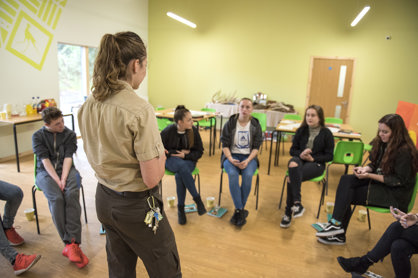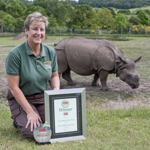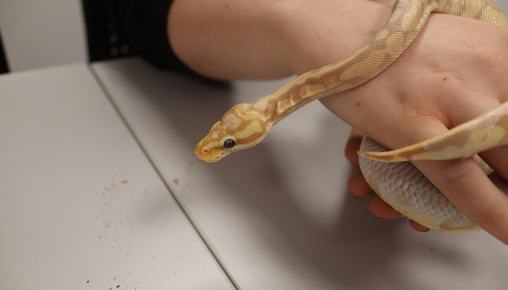 Home
Home
Your courses
Click Apply nowabove and continue to stage 2 where you can review and choose your 1st choice course to apply for.

Animal Care - Level 2
Start Date: 1st September 2025
Other start dates:
2nd September 2024

- Length 1 Year
- Study Full-Time
- Location
More about the course
Our Animal Care - Level 2 course is designed to help you recognise the signs of health, welfare and feeding for various animals. Throughout this programme, you'll work with a number of different species of animals, including ferrets, goats, reptiles and chickens. You'll also study the care of exotic animals, including exploring, sourcing and transporting different species, as well as preparing and maintaining appropriate accommodation.
You'll get an introduction to essential topics in Animal Care. You can learn important knowledge like feeding and handling, looking after accommodation and understanding the health and welfare of various animals. You'll also cover the science behind animal behaviour, take part in work experience and have the opportunity to gain valuable transferable skills that will help you in the next steps in your career.
Entry requirements
- 4 GCSEs grade 4/C or above, including a science qualification
- OR a Level 1 Diploma in a related subject
- A successful interview and reference.
What will I achieve?
Upon successful completion of this course, you will receive a Level 2 Technical Certificate in Animal Care.
What will I learn?
- Maintaining animal health and welfare
- Animal feeding and accommodation
- Animal behaviour and handling
- Caring for zoo animals
- British wildlife species, habitats and rehabilitation.
How is the course taught?
- Practical work
- Theory work.
How am I assessed?
- Assessments, both written and practical
- Externally set exams
- Practical assessments.
Moderation will be externally assessed by City & Guilds.
Work experience opportunities
As part of this qualification, you'll be taking part in 150 days of work experience. This placement must have an animal focus, such as a veterinary practice, with a dog groomer or at an animal collection.
English and maths
If you're aged 16-18 and haven't achieved a GCSE grade 4/C in English and maths, you'll need to take English and maths classes alongside your programme of study.
English will be included by using accurate vocabulary.
Maths will be included through weighing and measuring feed and completing both internal and external exams.
Where can I progress?
Upon successful completion of this course, you can go onto our Animal Management - Level 3 or our Work-Based Animal Care - Level 3 course.
Get in Touch
Meet our tutors and students

Nicola Anslow
Education Manager - Safari AcademyMy background is in teaching, where I taught in schools for over 20 years before becoming Education Manager at West Midland Safari Park. Working in the animal care industry makes my job very varied and exciting. The best part is being amongst the stunning collection of animals we have close by. The industry is competitive, but if you have a passion for caring for animals, it's right for you.

Chloe Walton-Stenson
Course Lead - Safari AcademyTeaching at the Safari Academy is a unique and incredible setting for our learners. It means we can teach them to develop their skills to industry standards. We have a supportive campus where teaching staff get to know every learner on site. As part of a fast-moving industry, there’s always more we can learn about animals, so still being part of the zoo community and a lecturer means I can share best practices with our students. I am so proud of working in a zoo that is a BIAZA member, and I hope our students will be proud of this, too.

Adam Green
Course Lead - Safari AcademyWithin my role, I can shape our students into becoming future Animal Management practitioners by utilising a blend of theoretical classroom activities with tangible industry practical experiences. We work tirelessly to promote not only our animals' welfare needs but also our students' outcomes so we can be confident in maintaining the health and welfare of animals in all settings. Alongside animal management knowledge, we also help foster independence and personal and employment skills using our industry professionals. Students can take what they have learned in the classroom and apply it at our dedicated Academy enclosures contained within our Academy under the watchful eye of our Discovery keeper.
Animal Care
Gallery

What can I do with a qualification in Animal Care?
Daily tasks:
- Maintains records, raises and forwards reports and certificates in compliance with current legislation.
- Carries out expert witness work and undertakes teaching of veterinary students.
- Performs ante-mortem inspection of animals destined for the food chain, and animal post-mortem examinations.
- Performs tasks relating to food safety policy, regulation of veterinary drugs, quality control of veterinary products.
- Euthanases old, sick, terminally ill and unwanted animals.
- Investigates outbreaks of animal diseases and advises owners on feeding, breeding and general care.
- Administers local or general anaesthetics and performs surgery.
- Inoculates animals against communicable diseases.
- Examines animals, diagnoses condition and prescribes and administers appropriate drugs, dressings, etc., and arranges or undertakes any necessary x-ray or other tests.
Powered by EMSI
Daily tasks:
- Advises clients on preventative medicine to maintain appropriate animal health and welfare.
- Maintains the biosecurity of the veterinary premises.
- Cares for animals in hospital accommodation and keeps accurate records.
- Collects and analyses blood, urine and other samples.
- Handles animals during treatment.
- Dispenses and administers medication and applies dressings to animals under direction from the veterinarian.
- Prepares operating theatre, sterilises equipment and assists in theatre as required.
- Assists the veterinary surgeon during surgical and medical treatments of animals.
Powered by EMSI
Daily tasks:
- Patrols public areas to search for and capture stray or nuisance dogs, and transports captured animals to kennels.
- Meets prospective owners and advises on animal selection and animal care.
- Checks animals for illness, treats minor ailments or calls for vet if further treatment is required.
- Houses, feeds, exercises, trains, grooms horses, dogs and other animals in preparation for entry to shows, races and other events.
- Cleans animals.
- Feeds, washes, grooms, trims and exercises animals.
Powered by EMSI
Daily tasks:
- Carries out maintenance on farm buildings, hedges, ditches and erects and repairs fences.
- Moves and handles livestock and tends them during birth and rearing of young.
- Treats minor ailments and assists veterinary surgeon as required.
- Cleans barns, sheds, pens, yards, incubators and breeding units and sterilises milking and other equipment as necessary.
- Weighs and measures foodstuffs, feeds animals and checks them for any signs of disease.
- Cultivates growing crops by hoeing, spraying and thinning as necessary.
- Operates farm machinery to prepare soil, fertilise and treat crops.
Powered by EMSI
What can I do with a qualification in Animal Care?
Veterinarians
Daily tasks:
- Maintains records, raises and forwards reports and certificates in compliance with current legislation.
- Carries out expert witness work and undertakes teaching of veterinary students.
- Performs ante-mortem inspection of animals destined for the food chain, and animal post-mortem examinations.
- Performs tasks relating to food safety policy, regulation of veterinary drugs, quality control of veterinary products.
- Euthanases old, sick, terminally ill and unwanted animals.
- Investigates outbreaks of animal diseases and advises owners on feeding, breeding and general care.
- Administers local or general anaesthetics and performs surgery.
- Inoculates animals against communicable diseases.
- Examines animals, diagnoses condition and prescribes and administers appropriate drugs, dressings, etc., and arranges or undertakes any necessary x-ray or other tests.
Powered by EMSI
Veterinary Nurses
Daily tasks:
- Advises clients on preventative medicine to maintain appropriate animal health and welfare.
- Maintains the biosecurity of the veterinary premises.
- Cares for animals in hospital accommodation and keeps accurate records.
- Collects and analyses blood, urine and other samples.
- Handles animals during treatment.
- Dispenses and administers medication and applies dressings to animals under direction from the veterinarian.
- Prepares operating theatre, sterilises equipment and assists in theatre as required.
- Assists the veterinary surgeon during surgical and medical treatments of animals.
Powered by EMSI
Animal Care Services Occupations
Daily tasks:
- Patrols public areas to search for and capture stray or nuisance dogs, and transports captured animals to kennels.
- Meets prospective owners and advises on animal selection and animal care.
- Checks animals for illness, treats minor ailments or calls for vet if further treatment is required.
- Houses, feeds, exercises, trains, grooms horses, dogs and other animals in preparation for entry to shows, races and other events.
- Cleans animals.
- Feeds, washes, grooms, trims and exercises animals.
Powered by EMSI
Farm Workers
Daily tasks:
- Carries out maintenance on farm buildings, hedges, ditches and erects and repairs fences.
- Moves and handles livestock and tends them during birth and rearing of young.
- Treats minor ailments and assists veterinary surgeon as required.
- Cleans barns, sheds, pens, yards, incubators and breeding units and sterilises milking and other equipment as necessary.
- Weighs and measures foodstuffs, feeds animals and checks them for any signs of disease.
- Cultivates growing crops by hoeing, spraying and thinning as necessary.
- Operates farm machinery to prepare soil, fertilise and treat crops.
Powered by EMSI
What's happening?
Events
Course Added
This course has now been added to your basket. Please click below to apply now or contine browsing.
Apply Now How To Apply For a Course
How To Apply For a Course
 Work Experience - Student
Work Experience - Student
 Student Support
Student Support
 Levels Explained
Levels Explained


